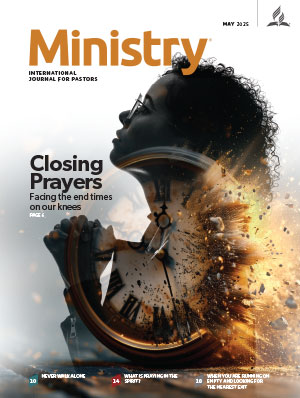At age 57, I have now reached the median age of my profession.1 Although I do not mind the gray hairs so much, the aches and pains of a well-traveled life do remind me that more days lie behind me than before me. At this stage of my pastoral ministry, I realize that if I neglect to mentor the next generation, I could very well be culpable for rendering my profession obsolete.
On many fronts, pastoral ministry challenges are daunting. From my vantage point this is especially true when it comes to emerging adults (aka young adults). After graduating from high school, half of them will drift away from our faith communities. While many of them may still endorse faith in the person of Jesus Christ, some will indicate no religious affiliation at all.2 The twenty-something years are filled with major transitions and decisions during which young adults shape their future.3 The local church is experiencing a fading influence in the looming generations and, potentially more alarming, in our own young adult children.
What’s needed to be effective
Methodologies and strategies so far have had limited success in stemming the hemorrhaging of young people from our congregations, yet much of our current ministry practices remains unchanged. The contemporary context that emerging generations face continues to grow ever more complex. At the same time, the typical local church remains committed to traditions that have little to no current relevance to young adult life.4 Scott Cormode cautions, “The church is perfectly calibrated for a world that no longer exists.”5
Dear fellow pastors, my hope is that you and I will bravely investigate and deal with these realities with spiritual boldness. May we engage the next generations with an authentic desire for meaningful relationships.6 Our leadership is still valued and important.
Three-fourths of church members and pastors surveyed endorsed leadership as the primary means of church effectiveness with young people.7 In a quantitative and qualitative study of more than 250 churches effectively involving and retaining young people (ages 15–29), more than 75 percent of the members named leadership as the “secret to their effectiveness.”8 But I have a far more personal question I want to pose to you, fellow pastors: What is your succession plan?
Apprenticing relationships
The admonitions of the apostle Paul to his protégé Timothy may feel more like an ancient biblical exhortation than an applicable premise for contemporary pastoral praxis: “Command and teach these things. Let no one despise you for your youth, but set the believers an example in speech, in conduct, in love, in faith, in purity” (1 Tim. 4:11, 12, ESV). Might pastors in the twenty-first century also take such a mentoring posture with emerging adults?
Six core commitments were identified in “churches that were growing in involving and retaining young people bringing overall vitality to the whole church.”9 Notable for me among them were keychain leadership and prioritizing young people everywhere.
Keychain leadership describes giving responsibilities and roles to young people that transcend tokenism and serve as an essential influence and consistent engagement of healthy church life.10
On Paul’s behalf, Timothy was to assume leadership in the local congregation, despite the pushback that he might encounter given his age. Such a keychain leadership role involved a wholistic approach, including, but not limited to, behavioral modeling, grace-oriented compassion, and aspiring toward virtuous, Christ-centered ideals.
Throughout the Scriptures, and explicitly in Jesus’s relationship with His disciples, we see constant illustrations of the teacher-student apprenticing relationship. Why is it so absent from contemporary pastoral practice? Paul’s teaching and instruction afforded Timothy pastoral leadership and authority, even with Paul absent (1 Tim. 4:13). Through it the apostle anticipated growth in both the congregation and Timothy himself (vv. 15, 16).
This type of intergenerational leadership training, maintains Steve Argue, associate professor of youth, family, and culture at Fuller Theological Seminary, is a powerful conduit in helping new generations constructively pursue answers to life’s most poignant questions. Argue also asserts the importance of identity, belonging, and purpose for young adults.11 If local pastors would consider apprenticing young adults as a succession strategy, the apprentice, the local church, and the pastor would all benefit.
Advocates for young adult engagement with pastors and church leadership include Filip Milosavljević, young adult pastor at Loma Linda University Church, who notes that such mentorship between generations affords beneficial partnerships and increased effectiveness for all parties.12 Instead of burnout and irrelevance, the local pastor may find active mentoring to be a way of magnifying ministry effectiveness through the life lens of the next generation.
Building strong relational rapport
Many of our local churches deploy ministry in a departmentalized fashion, often siloed except for occasional special emphasis weekends. While such a structuring of age groups does offer some benefits, the practice has left many of our churches languishing in their sense of community and connection. We can find the local church member completely ignorant of those outside of their own age demographic or stage of life, or worse, prejudicial because of society’s fixation on generational stereotypes.13
Given the increased complexity that emerging adulthood poses, young adults may feel alone, neglected, or even abandoned.14 Many local churches, in clinging to their antiquated ministry departments, do not know what to do with young adults, especially considering that they are postponing marriage and having children later in life compared to previous generations.
The core commitment of “prioritizing young people everywhere” is crucial for establishing vibrant congregational practice.15 Often, such next-generation engagement gets relegated solely to youth ministry. If any young adult ministry does exist at all, often it may be restricted to singles ministry, with its intrusive question of marital status being the only point of conversation.
The simple sharing of stories between the generations in a church can bring a stronger relational rapport between the various age groups.16 Learning to empathize and foster relational warmth creates vitality for the whole church. The local pastor who enables such interpersonal connections, especially with young adults, creates powerful bonding in the areas of identity, belonging, and purpose.17
The proverb “Train up a child in the way he should go . . . , even when he is old he will not depart from it” (Prov. 22:6, AMP) serves as a template for communal relationships between young and old. Such collaboration among parents, relatives, congregants, religious educators, ministry leaders, and pastors for the benefit of the next generation will foster a robust faith-forming web that imprints lasting biblical virtues in young lives.18 Young ones being “trained up” in the local church will have the most resilient faith for life.
If the local pastor, parents, and other church leaders leave the discipling of youth exclusively to the teen program, our young people will continue to graduate and leave not only high school but also church life. Conversely, if in your pastoral leadership, you implement a succession plan that prioritizes the mentoring of young people, it will offer them responsibilities and equipping that will provide spiritual kingdom expansion and relational continuity from generation to generation.
A thrilling venture
In our local congregation we have launched internship, residency, and apprenticeship initiatives in which I engage with youth and young adults in both ministry mentoring and vocational discipleship.19 It is a thrilling venture, but not without its pitfalls.
In all candor, even considering a succession plan has at times felt like a threat to my value as a local pastor, especially in areas where I seemed most important, most needed. I was struck to the core as Cormode quoted leadership expert Ronald A. Heifetz as saying, “What people resist is not change per se, but loss.”20 Would a succession plan affect my power, my significance?
If you relate to this fear, you are not alone as you consider your succession plan. I also struggle, yet I am encouraged that servant leadership is a blessing, a remedy, and a prophetic solution. As the apostle Peter declared:
“ ‘And in the last days it shall be, God declares,
that I will pour out my Spirit on all flesh,
and your sons and your daughters shall prophesy,
and your young men shall see visions,
and your old men shall dream dreams;
even on my male servants and female servants
in those days I will pour out my Spirit, and
they shall prophesy’ ” (Acts 2:17, 18, ESV).
Dear fellow pastors, I am praying we will take the posture of servant leaders with a relationally rich succession plan. I am anticipating the powerful Spirit of the Lord being poured out on all generations, fueling the next generations to succeed. As a median-age pastor, I reflect on days gone by, but I also have dreams of what succeeding generations will accomplish for God’s glory. In these last days, may we enact a ministry succession that mentors and empowers our sons and daughters until the day of His promised return.
- Christelle Agboka, “Secretary’s Report on Day Four of NAD Year-End Meeting Highlights Unity in Diversity,” North American Division of Seventh-day Adventists, Nov. 8, 2023, https://www.nadadventist.org/news/secretarys-report-day-four-nad-year-end-meeting-highlights-unity-diversity.
- Kara Powell, Jake Mulder, and Brad Griffin, Growing Young: Six Essential Strategies to Help Young People Discover and Love Your Church (Grand Rapids, MI: Baker, 2016), 15, 16.
- Meg Jay, The Defining Decade: Why Your Twenties Matter and How to Make the Most of Them Now, updated ed. (New York, NY: Twelve, 2021), 242.
- Steven Argue, Young Adult Ministry Now: A Growing Young Guide (Lincoln, NE: AdventSource, 2023), 16–26.
- Scott Cormode, The Innovative Church: How Leaders and Their Churches Can Adapt in an Ever-Changing World (Grand Rapids, MI: Baker Academic, 2020), 1.
- Clint Jenkin and A. Allan Martin, “Engaging Adventist Millennials: A Church Embracing Relationships,” Journal of Applied Christian Leadership 8, no. 1 (2014): 96–104, https://digitalcommons.andrews.edu/cgi/viewcontent.cgi?article=1162&context=jacl.
- Powell, Mulder, and Griffin, Growing Young, 56.
- Powell, Mulder, and Griffin, 55–58.
- Powell, Mulder, and Griffin, 42–47.
- Powell, Mulder, and Griffin, 208–210.
- Argue, Young Adult Ministry Now, 46–51.
- Filip Milosavljević, “Young Adults: Their Future, Our Future,” Ministry, February 2024, 6–9, https://www.ministrymagazine.org/archive/2024/02/Young-adults-Their-future-our-future.
- Milosavljević, 8, 9.
- .Jay, Defining Decade, 173, 182, 183.
- Powell, Mulder, and Griffin, Growing Young, 200–203.
- Jenkin and Martin, “Engaging Adventist Millennials.”
- Argue, Young Adult Ministry Now, 42–54.
- A. Allan Martin, “Embracing Those Who Reject Religion: An Interview with Roger Dudley,” Ministry, Jan. 2009, 18–20, https://www.ministrymagazine.org/archive/2009/01/embracing-those-who-reject-religion.
- Young Adult LIFE, “AdventHealth Interns Experience Local Ministry Engagement as Part of Leadership Development,” North American Division of Seventh-day Adventists, Sept. 10, 2024, https://www.nadadventist.org/news/adventhealth-interns-experience-local-ministry-engagement-part-leadership-development.
- Cormode, The Innovative Church, 182.













